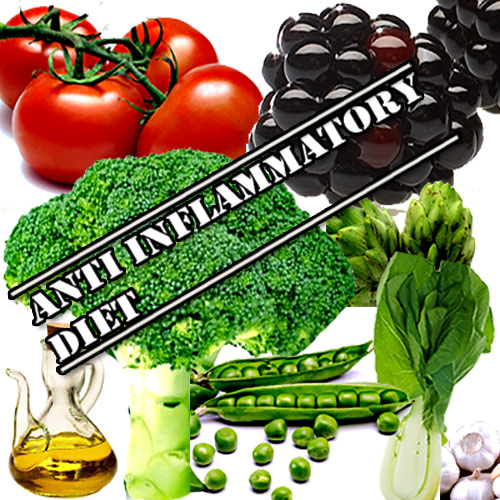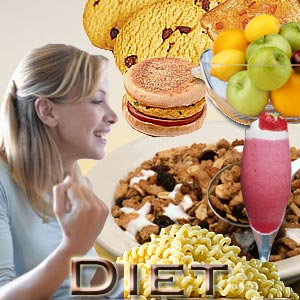Anti inflammatory Diet

Are you aware that chronic inflammation is the root cause for several serious illnesses including Alzheimer’s, heart disease, osteoarthritis, rheumatoid arthritis, Parkinson’s and even many cancers.
While we are more familiar with inflammation on the surface of our body, when inflammation persists it can damage the body and cause illness. When chronic inflammation is caused due to stress, lack of exercise, genetic predisposition and exposure to toxins, dietary choices can play a big role in making a difference. Inflammation plays a far greater role in certain maladies. In fact, it triggers chronic diseases over time. Establishing regular fitness regimen helps prevent systemic inflammation from building up.
Hence, it is imperative to understand the influence of specific foods that influence the inflammatory process and thereby contain/reduce long-term disease risks.
Why anti-inflammatory foods ?
Preparing and selecting anti-inflammatory foods based on scientific knowledge is crucial not only to help your body maintain optimum health but also provide protection from lifestyle and other diseases.
An anti-inflammatory diet is the key to sustained energy, ample vitamins and minerals, essential fatty acids and dietary fiber as well as protective phytonutrients.
It also slows the aging process by stabilizing blood sugar and increasing metabolism. And as a bonus, many persons find that they also lose weight by following an anti-inflammatory eating routine.
Antioxidant foods, essential fatty acids, minerals, sprouted seeds and leafy and cruciferous vegetables have been associated with lowered inflammation. Swiss chard, (bok choy) Chinese cabbage, celery, broccoli, berries, salmon and pineapples work wonders on protecting the body from oxidative stress and have also shown positive effects on reducing inflammation. Coconut oil, walnuts and chia seeds are powerful anti-inflammatory powerhouses.
Cardinal principles of anti-inflammatory diet
- Fiber-rich food reduces inflammation and hence it is recommended to consume at least 25 grams of fiber daily. Fiber can be found in fruits like bananas and blueberries, vegetables like okra, eggplant and onions and other whole foods. Best sources of fiber are barley and oatmeal.
- It is important to eat nine servings of fruits and vegetables daily, and one serving equals half a cup of cooked fruit or vegetable or one cup of raw leafy vegetable. Of course, herbs and spices such as turmeric and ginger can be added to give that extra punch.
- Alliums such as garlic, scallions, onions and leeks and crucifers such as broccoli, cabbage, cauliflower, green mustards and sprouts should be consumed four servings every week. This can also help in lowering the risk of cancer.
- Limited intake of saturated fat can help reduce the risk of heart disease. Hence it is recommended to take only about 20 grams per 2000 calories of saturated fat in daily diet. Red meat should be limited to once per week and it can be marinated with herbs, spices and tart, unsweetened fruit juices to reduce the toxic compounds formed during cooking.
- Research reveals that foods rich in omega-3 fatty acids considerably reduce inflammation and help lower risk of chronic diseases such as cancer, arthritis and heart ailments. And all these conditions have high inflammatory process as their root cause. Flax meal, walnuts and beans are excellent vegan sources while cold-water fish such as salmon, oysters, herring, mackerel, trout, sardines and anchovies offer considerable benefits. Eating fish at least thrice a week is good as it contains healthy fats.
- Virgin and extra-virgin olive oil that contains healthy fats is the best bet for anti-inflammatory benefits. Sunflower and safflower oil are other alternatives.
- For snacking, aim for fruit, plain or unsweetened yogurt, celery sticks, carrots, or nuts like almonds, walnuts and pistachios.
- Avoid foods high in refined sugars such as high-fructose corn syrup, high in sodium foods which can contribute to inflammation throughout the body.
- It is not only essential to avoid refined sugars but artificial sweeteners as well. Increased insulin resistance which can lead to type-2 diabetes, raised uric acid levels, raised blood pressure and increased risk of fatty liver disease are all caused by excess fructose.
- Trans fats have to be cut out. To go about this, read labels and steer clear of products that contain words such as hydrogenated or partially hydrogenated oils. Trans-fats can be found in select margarine, crackers and cookies.
- Phytonutrients can be found aplenty in fruits and vegetables and this can be used to sweeten your meals by adding apples, apricots, berries and carrots instead of artificial sweeteners. Flavor foods with spices such as cloves, cinnamon, turmeric, rosemary, ginger, sage and thyme.
Dishing out healthy recipes does not involve slaving for hours over the stove. Here are some anti-inflammatory recipes, low in calorie but rich in anti-inflammatory ingredients.
Beet Detox salad
Beet, coarsely grated 1 gram
Carrot, coarsely grated 1 gram
Apple diced 1 gram
Almonds, finely chopped, 1 tablespoon
Flax, hemp, or pumpkin seed oil 2 tablespoon
Lemon juice 2 tablespoon
Greens mixed 4 cups
Options:
Fresh parsley finely chopped 2 tablespoon
Garlic cloves, minced 2
Sea salt or pink rock salt ¼ teaspoons
Toss all ingredients except greens together into a large bowl. Mix in choice additions if necessary. Make the dressing up to 2 days in advance and refrigerate. Divide mixed greens between 4 plates and top with apple mixture.
White bean and chicken chili Blanca
Chicken, tenders or boneless, 1 pound
Extra virgin olive oil 2 tablespoon
Onion, diced, medium 1
Garlic cloves 2
Beans, drained and rinsed 215 ounce cans white or otherwise
Corn kernels, fresh or frozen 1 cup
Green Chiles, chopped 14 ounce
Cumin powder 2 teaspoons
Chili powder 2 teaspoons
Cayenne pepper 1/8 teaspoon
Water 3 cups
Cheese grated 2 cups
Cilantro, chopped 2 tablespoons
Season the chicken with salt and pepper. In a large saucepan, heat oil over high heat and chicken pieces and cook, stirring until brown for 2-3 minutes. Lower the heat to medium, and add onion and garlic. Cook until the onion is translucent for 5 minutes. Add beans, corn, chilies, spices and water and bring to a boil, reduce the heat to low and simmer uncovered for an hour. Top each serving with a spoonful of cheese and sprinkling of cilantro.
Well-dressed Salmon
Cucumber seedless ½
Plum tomatoes 2 small
Onion, finely chopped, divided ¼
Mustard 2 tablespoons
Sugar 2 tablespoons
White wine vinegar ¼ cup
Virgin olive oil ½ cup
Fresh dill finely chopped ¼ cup
Salt to taste
Black pepper freshly ground
Salmon fillets, skinless 4
Seafood seasoning
Dice cucumber into ¼ inch pieces to peel or not to peel. Seed and dice the tomatoes into ¼ inch pieces and combine cucumber, tomatoes, half the red onion in a bowl and set aside. Whisk mustard, sugar, wine vinegar and remaining half of the shallots, stream in virgin olive oil while continuing to whisk.
Stir in dill and season dressing with salt and pepper to taste. Season the salmon with seafood seasoning and little black pepper. Heat the non stick skillet with a drizzle of virgin oil over medium heat and place salmon rounded side down and cook until golden and little crispy at the edges for about 3 minutes.
Flip and cook for 2 more minutes for a pink center and 4 minutes for opaque fish. Transfer salmon to dinner or serving plates, top with cucumber and tomato relish and cover with a liberal amount of dill dressing.
Curried potatoes and poached eggs
Potatoes 2
Ginger, fresh 1 inch
Garlic cloves 2
Olive oil 1 tablespoon
Curry powder 2 tablespoon
Tomato sauce 115 ounce
Eggs large 4
Cilantro fresh ½ bunch
Wash and cut the potatoes into ¾ inch cubes and place them in a large pot and cover with water. Cover the pot with a lid and bring it up to a boil over high heat and boil potatoes for about 5 minutes or under they are tender when pierced with a fork. Drain the cooked potato water. Peel the ginger with a vegetable peeler and scrape the skin and grate about 1 inch of ginger.
Sauté the ginger and garlic over medium low heat for about 2 minutes and add the curry powder to the skilled and sauté for about a minute more to toast the spices. Add tomato sauce and stir to combine and turn the heat to medium and heat the sauce through.
Add the cooked and drained potatoes to the skillet and stir to coat in the sauce. Add water if the mixture seems dry or pasty. Create four small wells in the potato mixture and crack an egg into each. Place a lid on the skillet and let it come up to a simmer with the eggs in the sauce for about 10 minutes or until cooked. Top with chopped fresh cilantro.
Gingerbread oatmeal
Water 4 cups
Steel cut oats 1 cup
Cinnamon ground 1 ½ cups
Coriander, ground ¼ teaspoon
Cloves ground 1 teaspoon
Ginger ½ teaspoon
All spice ¼ teaspoon
Nutmeg 1/8 teaspoon
Cardamom ¼ teaspoon
Maple syrup to taste
Cook the oats to package directions but include the spices when oats is added to the water. When finished cooking, add maple syrup to taste.
Anti-inflammatory diet principles
- While most adults need to consume between 2000 to 3000 calories daily, less active people need fewer calories. The distribution of calories should be as follows: 40 – 50 percent of carbohydrates, 30 percent from fat, and 20 to 30 percent from protein.
- On a 2000 calorie a day diet, an adult woman should consume between 160-200 grams of carbohydrates daily and the majority of this should be less-refined, less-processed foods with a low glycemic load. Consumption of foods made of wheat flour and sugar and most packaged snack food should be reduced. Instead eat whole grains such as brown rice and wheat and more beans, squashes, sweet potatoes. Avoid products made with high fructose corn syrup.
- On a 2000 calorie a day diet, 600 calories can be from fat that is about 67 grams. Reduce intake of saturated fat by eating less butter, cream, high-fat cheese, un-skinned chicken, and fatty meals and products made of kernel oil. Instead use extra virgin olive oil as main cooking oil.
- Again, on a 2000 calorie a day diet, daily intake of protein should be between 80 to 120 grams and it is better to eat less protein if you have liver or kidney problems, allergies and autoimmune disease.
- Decrease intake of animal protein except fish and high quality natural yogurt and eat more vegetable protein from beans and whole soy foods.
- Eating 40 grams of fiber daily is good. This can be achieved by consuming fruits, especially berries, vegetables and whole grains.
- Phytonutrients by way of fruits and vegetables and mushrooms are necessary to get maximum natural protection against age-related diseases. Vegetables and fruits from all color spectrum such as berries, tomatoes, oranges, yellow fruits and dark leafy greens can be chosen.
- Eat cabbage family vegetables regularly and include soy foods in the diet. Drink tea, especially green tea instead of coffee and avoid alcohol and use red wine preferentially. Enjoy plain dark chocolate in moderation.
- Above all, drink pure water or drinks that are mostly water such as tea, diluted fruit juice or water with lemon throughout the day.
Understand that in addition to lowering inflammation, a more natural and less processed diet can have noticeable effects on your physical and emotional health. It is beneficial not only to reduce chronic diseases but also for improving the general wellness and quality of life.
Top of the Page: Anti inflammatory Diet
Tags:#anti inflammatory diet #anti inflammatory foods

Therapeutic Lifestyle Changes Diet
Intermittent Fasting Plan
Flexitarian Diet
Dukan Diet Plan
Diet Plateau
High Protein Diet
Elimination Diet
Raw Food Diet
Paleo Diet
Liver Cleansing Diet
Intermittent Fasting Diet
Low Fat Low Cholesterol Diet
Low Carb Diet
Vegan Diet Plan
Hay Diet
Sacred Heart Diet
Heart Attack Diet
Diet after Gastric Bypass
RICE Diet
Gluten Free Diet
Acid Reflux Diet
Detox Diet
Sonoma Diet
Glycemic Index Diet
Montignac Diet
Diabetic Diet Plan
Healthy Breastfeeding Diet
Negative Calorie Diet
Fad Diet
Blood Group Diet
Diverticulitis Diet
DASH Diet
Ornish Diet
3 Day Diet Strategy
Ketogenic Diet
Zone Diet Plan
Anti Aging Diet
South Beach Diet
Gall Bladder Diet
Low Cholesterol Diet
Low Sodium Diet
Diet and Kidney Disease
Scarsdale Diet Plan
Macrobiotic Diet
Osteoarthritis Diet
Depression Diet Plan
Migraine Diet
Restricted Salt Diet
Gout Diet
Rotation Diet
Diet Cancer Patient
Ways to better Health

Boost Metabolism
BMI Calculator
Low Fat Dessert
Whey Protein
Diet and Fitness
Fitness Exercise Articles
Cardio Workout
Aerobics
Yoga
Body Toning
Top of the Page: Anti inflammatory Diet
Popularity Index: 102,578

